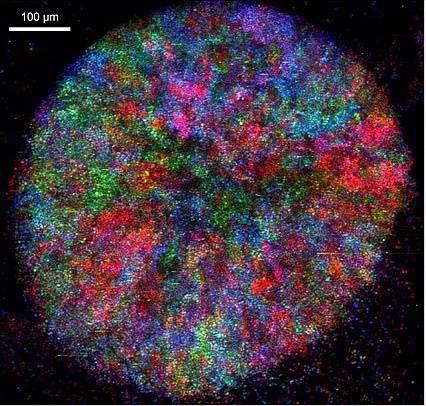It is said that when there is an exchange of metabolic products of the cells with other cells, their lifespan gets longer. This discovery has been given by a research group at Charité – Universitätsmedizin Berlin, which made the breakthrough in a study with the help of yeast cells.
 Self-establishing metabolically cooperating communities (SeMeCos) provide a cell model that enables researchers to study the exchange of metabolites between yeast cells. A team at Charité has now shown that such metabolic exchange extends the lifespan of yeast cells. Image Credit: Kate Campbell, Markus Ralser. CC-BY, https://doi.org/10.7554/eLife.09943.002
Self-establishing metabolically cooperating communities (SeMeCos) provide a cell model that enables researchers to study the exchange of metabolites between yeast cells. A team at Charité has now shown that such metabolic exchange extends the lifespan of yeast cells. Image Credit: Kate Campbell, Markus Ralser. CC-BY, https://doi.org/10.7554/eLife.09943.002
The reality that such exchanges directly affect cell lifespans could play a crucial role in future research into human aging processes and also age-related diseases. The study has been published in the latest issue of the journal Cell.
Metabolism is inseparably linked to aging: While it helps retain vital processes, makes one grow, and activates cellular repairs, it also generates substances that tend to damage human cells and lead to aging.
The metabolic processes that occur within cells are highly comple. The exchange of substances between cells in a community is one important factor, because it has a substantial impact on the metabolism occurring inside a cell.”
Markus Ralser, Professor and Director, Department of Biochemistry, Charité-Universitätsmedizin Berlin
Ralser is also an Einstein Professor of Biochemistry on Charité’s medical faculty.
Cells are in regular touch with neighboring cells—within tissues, for example. They release a few substances and use up others from their encircling environment. In a recent study performed, the team headed by Professor Ralser, a famous expert in metabolism, analyzed if the exchange of metabolic products (called metabolites) impacts the cells’ lifespan.
The scientists made use of yeast cells and performed experiments to fix their lifespan. Yeast cells are known to be a key model in basic research, a dominant microorganism in biotechnology, and essential in medicine since they can result in fungal infections.
We showed that the cells lived around 25 percent longer when they exchanged more metabolites with each other. So then we obviously wanted to identify the substances and exchange processes that are behind this life-prolonging effect.”
Dr Clara Correia-Melo, Study Lead Author, Department of Biochemistry, Charité Universitätsmedizin Berlin
For this to be done, the scientists employed a unique analytical system aided by mass spectrometry enabling them to accurately track the exchange of metabolites present between cells. They discovered that young cells, which were still capable to divide well and frequently, released amino acids that were used up by older cells.
Amino acids are considered to be the building blocks that make up proteins. The research group found out the fact that the exchange of the amino acid methionine prolonged the lives of the cells that have been involved. Methionine occurs in all organisms and plays a vital role in protein synthesis, and also several other cellular processes.
Professor Ralser stated, “Interestingly, it was the young cells’ metabolism that prolonged the lives of the old cells.”
The cells within the community used up methionine and released glycerol. In return, the existence of glycerol impacted methionine-producing cells, making them live longer. Glycerol is required for building cell membranes and plays a role in protecting cells.
Dr Correia-Melo stated, “It’s a win-win situation. As cells engage in this collaborative exchange, they prolong the lifespan of their community as a whole.”
This study of yeast cell communities performed is known to be the first to display that metabolite exchange tends to directly affect the lifespan and cells’ aging process. Also, scientists doubt this applies to other kinds of cells, like those in the human body, and are targeting to analyze this in additional studies.
A better understanding of the complex metabolic pathways both within and between cells will help with investigations into how age-related diseases like diabetes, cancer, and neurodegenerative conditions develop.”
Markus Ralser, Professor and Director, Department of Biochemistry, Charité-Universitätsmedizin Berlin
Ralser added, “Metabolite exchange between cells has been overlooked in the past, but it’s clearly a very important factor in the cellular aging process. We hope our study will help make the exchange of metabolic products between cells an area of greater focus in future research.”
As a contribution, Professor Ralser is currently planning to examine the accurate mechanisms enabling glycerol to safeguard cells and expand their lives.
Source:
Journal reference:
Correia-Melo, C., et al. (2022) Cell-cell metabolite exchange creates a pro-survival metabolic environment that extends lifespan. Cell. doi.org/10.1101/2022.03.07.483228